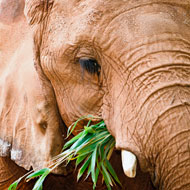Japan's ivory tusk registration system 'awash with fraud'

Ivory traders are taking advantage of loopholes in the system.
An undercover investigation has revealed widespread abuse of Japan's ivory tusk registration system.
A report released by the Environmental Investigation Agency (EIA) found that ivory traders are routinely making fraudulent declarations to secure tusk registration.
EIA says this is fuelling the illegal ivory trade and undermining international efforts to protect Africa's elephants from poaching.
Japan signed a CITES international ivory trade ban in 1989, but all whole ivory tusks imported prior to this date should be registered with the government. Proof of legal origin and acquisition prior to registration is also required.
But according to EIA's investigation, ivory traders are taking advantage of loopholes in the system. Out of 37 traders they surveyed, 30 offered to engage in illegal activities such as purchasing and processing unregistered tusks or registering tusks using false information.
Common responses from traders included: "We must lie on these statements" and "If you want a [registration] certificate you can't tell the truth".
Japanese law allows tusks to be registered on presentation of official documents, such as customs forms, and declaration by the tusk owner and a neighbour or family member. But routine practice is to register tusks on the basis of declarations alone.
Danielle Fest Grabiel, EIA's senior wildlife policy analyst, said: "Japan's weak wildlife law does not require a shred of evidence for tusk registration. The system is wide open to abuse and laundering of illegal ivory into the legal market."
These revelations of fraud coincide with a rapid upswing in Japan's ivory trade and a poaching crisis in Africa, where more than 30,000 elephants are being killed each year for their tusks.
"Africa's elephants are paying for Japan's shocking failure to enact its legal commitments to enforce rigorous controls to prevent illegal ivory trade," said Allan Thornton, president of EIA. "Only a ban on Japan’s domestic ivory trade and permanently ending registration of tusks can rectify the damage."



 The BSAVA has opened submissions for the BSAVA Clinical Research Abstracts 2026.
The BSAVA has opened submissions for the BSAVA Clinical Research Abstracts 2026.